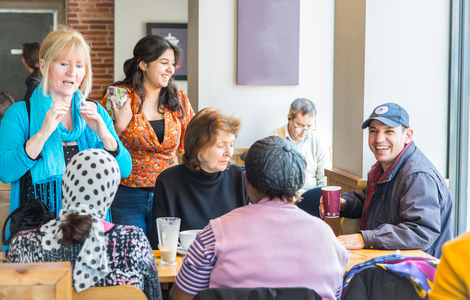Dorothy's story

After the passing of her daughter and husband, Dorothy lives alone in her Westminster home. Before the Covid-19 pandemic she kept herself active and busy through a range of activities including Octavia’s group befriending sessions. These were put on hold at the end of March, but it is since then that her engagement with Octavia’s service has proved more crucial than ever. With shielding measures leaving her housebound, she is grateful for the support she has received through the homes, care and support provider’s outreach and befriending offer.
“I can sit here and feel very down, I have pictures of my daughter surrounding me and I don’t know whether it’s a good thing they’re there or not because they reminds me of her. I sound as if I’m okay but I am sad, very sad at times… The calls with Stephanie [Dorothy’s telephone befriender] and Jemma [Outreach Worker] have been very helpful. It’s lovely to get a phone call; it’s nice to have the experience of listening and talking to people. You can so easily get down and depressed sitting here.”
As an avid athlete and sportswoman, Dorothy used to swim for charities such as Christian Aid and helped teenagers in her community learn to swim too. Being involved in the community was always important to her and this passion was evident in her role as a Nursery Nurse. As someone who values her connection with the community, Dorothy cherishes the bonds she has made with local older people through Octavia’s coffee mornings.
“I like to feel connected to my community and that it why it was lovely to attend the Coffee Morning because it sustained that feeling of connection. Since the coffee mornings were put on hold, I have kept in contact with two members. We got friendly through these meet ups and it’s nice that we are still in touch. I look forward to when this group can run again as I miss the face-to-face interaction.”
The pandemic has meant that many more people have gained personal insight into what it means to be socially isolated or lonely – an epidemic that has been exacerbated due to social distancing restrictions. Reflecting on this and thinking about the change she would like to see for older people, Dorothy advocates for a greater connection to the outside world for marginalised members of the community.
“It can be a very lonely time. Older people sometimes can’t cope with it. People need to reach out to them and make sure they’re okay. What Octavia is doing is what we need more of. The district nurses have also been involved with me a lot, so it’s been okay for me. They referred me to the food bank, and they made sure I have food here. Some people haven’t got this offer of support they can rely on might be suffering as a result. I imagine it would be very hard for those people. I once fractured my spine looking after my husband, and it took three days for someone to come and visit him whilst I was in hospital. It’s things like that that can happen and need to be avoided.”
Dorothy highlights the importance of treating older people with the respect and dignity they deserve.
“People speak for the elderly, but you can be 100 and still want to be part of the community and a group. They still have their faculties and people need to treat them with humanity. Just talk to older people and listen like we’re human beings. It’s important, the listening and treating us with respect. A lot of people don’t do that. They answer the questions themselves… You [Octavia] treat the elderly with respect and humanity.”